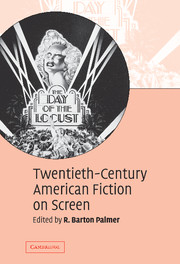Book contents
- Frontmatter
- Contents
- List of illustrations
- Notes on contributors
- Acknowledgments
- Introduction
- 1 Filming an unfinished novel: The Last Tycoon
- 2 The texts behind The Killers
- 3 The Day of the Locust: 1939 and 1975
- 4 Ship of Fools: from novel to film
- 5 Intruder in the Dust and the southern community
- 6 Dramatizing The Member of the Wedding
- 7 Film and narration: two versions of Lolita
- 8 World War II through the lens of Vietnam: adapting Slaughterhouse-Five to film
- 9 John Huston's Wise Blood
- 10 Genre and authorship in David Cronenberg's Naked Lunch
- 11 Screening Raymond Carver: Robert Altman's Short Cuts
- 12 The Color Purple: translating the African-American novel for Hollywood
- 13 The specter of history: filming memory in Beloved
- 14 Filming the spiritual landscape of James Jones's The Thin Red Line
- Filmography
- Index
- References
1 - Filming an unfinished novel: The Last Tycoon
Published online by Cambridge University Press: 12 January 2010
- Frontmatter
- Contents
- List of illustrations
- Notes on contributors
- Acknowledgments
- Introduction
- 1 Filming an unfinished novel: The Last Tycoon
- 2 The texts behind The Killers
- 3 The Day of the Locust: 1939 and 1975
- 4 Ship of Fools: from novel to film
- 5 Intruder in the Dust and the southern community
- 6 Dramatizing The Member of the Wedding
- 7 Film and narration: two versions of Lolita
- 8 World War II through the lens of Vietnam: adapting Slaughterhouse-Five to film
- 9 John Huston's Wise Blood
- 10 Genre and authorship in David Cronenberg's Naked Lunch
- 11 Screening Raymond Carver: Robert Altman's Short Cuts
- 12 The Color Purple: translating the African-American novel for Hollywood
- 13 The specter of history: filming memory in Beloved
- 14 Filming the spiritual landscape of James Jones's The Thin Red Line
- Filmography
- Index
- References
Summary
When F. Scott Fitzgerald (b. 1896) died of a heart attack at age forty-four, on December 21, 1940, in Hollywood, he left behind a novel-in-progress about the motion picture industry. A few weeks later, his companion, the Hollywood columnist Sheilah Graham, sent the author's draft materials to his editor, Maxwell Perkins, at Charles Scribner's Sons. After considering several options, including hiring another writer to complete the work following Fitzgerald's outlines and notes, Perkins enlisted the literary critic (and friend of Fitzgerald) Edmund Wilson – whom Graham had also contacted shortly after the author's death – to shape and edit the manuscript for publication. As titles, Fitzgerald had considered “Stahr: A Romance,” after the novel's central character, Monroe Stahr, a Hollywood studio executive, and “The Love of the Last Tycoon: A Western,” giving the work a different, perhaps more ironic, genre connotation. Wilson's version was published in October 1941 as The Last Tycoon: An Unfinished Novel, in a volume with The Great Gatsby and five of Fitzgerald's most important short stories.
“Unfinished works by great writers form a category as haunting as it is unsatisfactory,” the novelist Alan Hollinghurst has written. “In gratifying a curiosity about what might have been, they heighten the feeling of loss.” One certainly feels a sense of loss at Fitzgerald's early death, yet in the case of The Last Tycoon what exists in published form seems almost more of a benefaction than a cause for regret.
- Type
- Chapter
- Information
- Twentieth-Century American Fiction on Screen , pp. 8 - 26Publisher: Cambridge University PressPrint publication year: 2007
References
- 3
- Cited by

